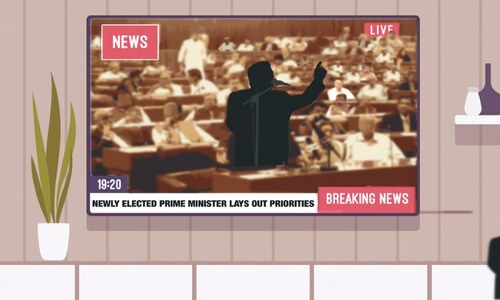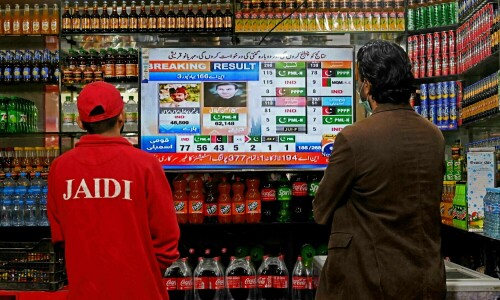The so-called ‘emotional vote’ is something that, for almost a decade now, has been increasingly attracting the attention of political scientists. This is largely due to the electoral rise of populism in a number of countries from 2010 onwards.
Most political scientists are of the view that populist parties have been the biggest beneficiaries of the emotional vote. Therefore, populist rhetoric is consciously shaped to trigger the electorate’s emotions.
A 2020 study by the Belgian political scientist Caroline Close and researcher Emilie van Haute showed that, if a voter is experiencing ‘negative’ emotions, especially anger and bitterness, he/she is most likely to vote for populist outfits. In fact, in certain cases, both negative and ‘positive’ emotions can be present in a single voter.
During the 2018 elections in Pakistan, negative as well as positive emotions were on display in voters who cast their ballots for Imran Khan’s populist Pakistan Tehreek-i-Insaf (PTI) — especially in Khyber Pakhtunkhwa (KP), Punjab and in Sindh’s capital city, Karachi.
Unlike in 2018, the PTI’s success at the polls this time has been wholly powered by voters’ negative emotions, a response to the crackdown against the party
In the run up to the 2018 polls, PTI’s message was a mixture of idyllic promises and sensational warnings. The party sketched an image of a Pakistan that would (thanks to PTI) become like a Scandinavian welfare state, a bastion of Islam, leader of the Muslim ummah, and thus entirely free of corruption and immoralities, and where people from other countries would come to work.
On the other hand, the warning bit in the message was that, if established mainstream parties were allowed to continue ruling the country, Pakistan would become a ‘banana republic.’ So, those who voted for PTI in 2018 were full of hope and joy that PTI would hand them the kind of country it was promising. After casting their ballot, they felt satisfied they were playing a role in the process of constructing a new Pakistan (‘Naya Pakistan’).
The hope of creating a new Pakistan (positive emotion) and the anxiety/fear of ‘corrupt’ parties stopping this from happening (negative emotion), were both instrumental in influencing the emotions of PTI voters in 2018. PTI, therefore, largely received the emotional vote in 2018. It once again received the same during the recently held general elections. But this time, the emotions involved in this respect were entirely negative. These included resentment, bitterness and anger.
PTI is a besieged party. Ever since it lost the unabashed support that it was getting from the military establishment till late 2021, and especially after it began to face a serious crackdown by the state due to the involvement of the party in last year’s May 9 and 10 riots, most of its supporters could not swallow the fact that their party, too, could be treated in the same manner that other big and small parties have in the distant and not-to-distant past.

The party’s jailed leader, Imran Khan, and his supporters were overcome by a feeling of being betrayed. This feeling then mutated into becoming outright resentment and anger. But these emotions were largely internalised due to the crackdown and the fear which this crackdown generated. Therefore, the 2024 elections became a way for these emotions to be expressed without the fear of being ‘sorted out.’
My view is that the sense of betrayal, the anger and the resentment were likely to remain internalised had the state not been in such a hurry to get special courts to deliver a hat-trick of verdicts against Khan, especially the verdict that annulled Khan’s third marriage. The verdict, delivered just two days before the elections, heightened the feeling of resentment and anger among PTI supporters. What’s more, the verdict was also squarely criticised even in non and anti-PTI circles.
There was never any doubt about PTI’s robust vote bank in KP. So, the emotional vote mostly came into play in Punjab, galvanised by the lingering sense of betrayal and, more so, intensified by the anger towards the marriage verdict, delivered just days before the election. This was a monumental blunder by a state which now sees Khan and his party as existentialist threats.
But the emotional vote for PTI was weak across Sindh, where the ‘pragmatic vote’ remains strong and is largely cast for the Pakistan Peoples Party (PPP). Even in Sindh’s capital city Karachi, which has a Mohajir majority (42 percent), and where PTI had swept the 2018 polls, the emotional vote for PTI was mostly restricted to affluent localities and in certain middle class areas.
I had predicted seven National Assembly (NA) seats for the PPP here, four to six for Muttahida Qaumi Movement-Pakistan (MQM-P), three to four for PTI, and one to two for Jamaat-i-Islami (JI). PPP did win seven, mainly from multi-ethnic areas of the city. But the major surprise was MQM-P winning 15 seats.
My prediction was that MQM-P, JI and PTI would be battling it out in the city’s Mohajir-majority areas. This did happen but, apparently, the Mohajirs decided to vote for MQM-P. The PTI and JI have questioned these results. The question is how could MQM-P, a party that had splintered in 2016 and then boycotted the 2023 local bodies elections, return to the fore with such a bang?
Karachi is not a sentimental city. It may not be a massive hub of support for the PPP as the rest of Sindh is, but the nature of Karachi’s vote, too, is as pragmatic as it is elsewhere in the province. Same is the case in Balochistan. So, I never foresaw an overwhelming emotional vote for PTI in these provinces. The emotional vote mainly emerged in northern and central Punjab and in KP.
The negative emotions which powered these votes to give the ‘traditional’ vote of the PML-N a run for its money in Punjab, have to be methodically and intelligently addressed. But these emotions have given the besieged Khan a taste of victory, albeit a marginal one. He may try to further enhance these emotions, which will be a really bad idea.
If these emotions spill over, as they did on May 9 and 10 last year, then those who have been using the word ‘fascism’ so casually may yet see actual acts of fascism. Let’s hope this never happens.
Published in Dawn, EOS, February 18th, 2024



































